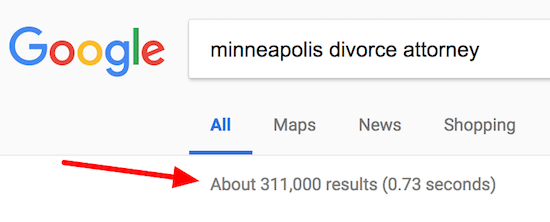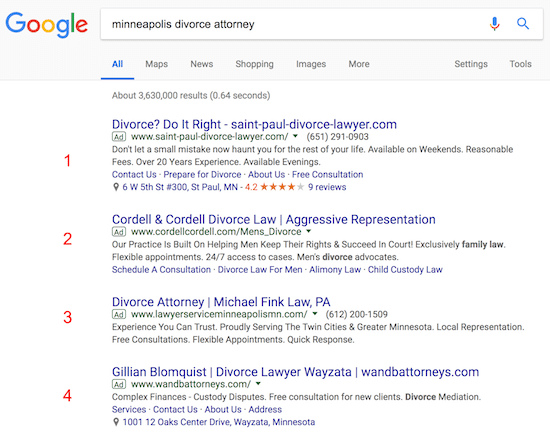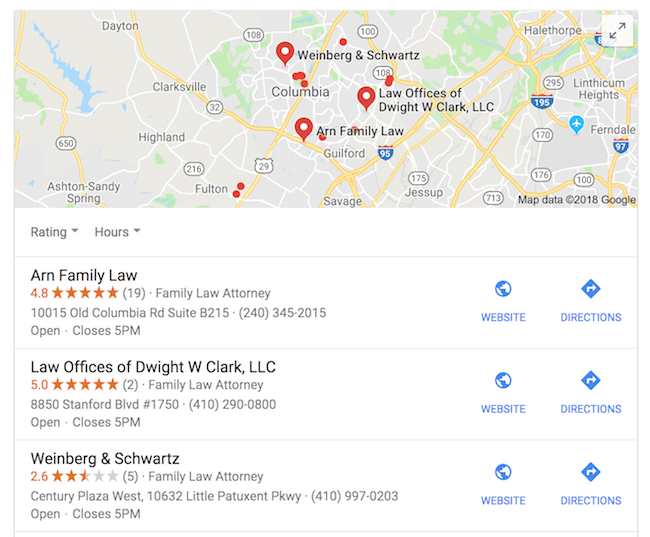Menu
May 22nd, 2018
Running and growing a small law practice is hard. The typical day of a solo and small firm lawyers are filled with wildly varied duties. At any moment they could be battling their computer, networking with potential clients, invoicing, attending a CLE, taking out the trash and, you know, helping actual clients.
We've been with many clients through the entire lifecycle of law firm development. In the early days of starting a practice a lawyer can typically do it all, but as they become more successful they inevitably hit a wall called the 24-hour day. This forces hard choices about how to best spend time, what to outsource to vendors and what employees to hire.
Still, the allure of doing and controlling all of the business is strong for many small practice owners. So when we're hired to blog, optimize websites or run search advertising campaigns clients still want to know, "What's the best thing I can do to help the online marketing effort?"
The answer to this is simple and can take as little as 10-20 minutes a week: Monitor, manage and enhance your reputation online.
Reputation Really Matters, Always
Hiring a lawyer is scary and hard. For normal folks, seeking out a lawyer means something serious, likely life changing, is afoot. Divorce, financial trouble, serious injury, deportation, criminal charges, a death in the family and contemplating one's mortality all give rise to the need for a lawyer. For businesses, it's often about money, staying out of trouble, getting out of trouble and planning for the future. It's all serious and typically uncharted territory for the potential client.
No matter whether a law firm caters to consumer or business clientele, long term success depends on a sterling reputation. Before the internet, a lawyer's credibility was conveyed by word-of-mouth where nuance and context could be shared personally between two parties in conversation. Now, reputation is distilled down to oversimplified, and very popular, 5-star rating and comment systems. Attorneys need to take the bull by the horns and be proactive with online reviews before a disgruntled client, potential client, opposing party or unscrupulous competitor tanks it.
Let Your Reputation Make the Choice for Clients
Making decisions, especially in the face of so many choices, can be overwhelming. A search for "noise cancelling headphones" on Amazon yields 10,000+ results. When a potential client searches for an attorney online they are instantly hit with at least 20 choices on page one and total choices in the thousands. How does one go about making a choice about something so serious with so many options?
In the face of overwhelming choices, people freeze. Psychologist Barry Schwartz elegantly describes this in his TED Talk and book "The Paradox of Choice: Why More Is Less." In essence, when people have too many choices they freeze, delay making a decision and are less happy with the decision they've made.
So how do companies like Amazon and Google address the decision paralysis problem? They share the recommendations of their customers and then visually categorize results they want you to focus on into smaller, more digestible blocks of information.
Amazon shows star ratings and total review counts next to products. Easy to compare options.
Google shows advertisements first and only shows four at the top and two or three at the bottom. Easy to digest.
Amazon also graphically highlights products that are "best sellers" and "Amazon Choice" with graphic highlights that attract your attention.
Now, most importantly for law firms, Google shows local business search results with star ratings, total review count and a map graphic, and then limits it to just three businesses. It's the trifecta — visually eye-catching, easy to digest and easy to compare — and the user sees all this information before making a click!
Google local search results not only appear when someone searches for legal help but also when someone searches the name of a specific lawyer or law firm. Clients do name searches to get the firm's contact information and potential clients do them to follow up on a referral to a lawyer or firm. And searches for attorney and firm names frequently show not only Google business reviews, but also reviews from popular sites like AVVO, Yelp, Lawyers.com and more.
If there is one thing an attorney can do to improve their online image and enhance all of their other marketing efforts, it is to regularly and proactively solicit clients for online reviews to bolster their reputation online.
Yes, Review Websites Stink, But...
We recognize online review and local business listing websites like Google, AVVO and Yelp are far from perfect, especially for something as complicated as legal services. (Most attorneys would use even harsher words to describe how they feel about them.) The sites feel unfair and burdensome to most attorneys. Common grievances we hear are:
- It's time consuming to seek reviews
- Inexperienced or incompetent attorneys being rated highly
- Don't want to bother clients
- This isn't pizza... experience and quality should count more than proximity to the user
- Confidentiality and rules of professional conduct prevent public responses to reviews
- Can't opt-out of being listed on review websites
- Can't remove bad reviews
The thing is, potential clients like looking at reviews. Potential clients don't know all of the inside baseball about review websites and their shortcomings. In their minds this information greatly simplifies the difficult choice of finding an attorney. Also, review websites already exist, show up when people are looking for attorneys and aren't going away. Further, our analysis of hundreds of law firm websites shows that client testimonial and review pages are consistently among the most viewed pages. This all means that, across the board, law firms that take online reviews seriously get better rankings and more traffic — and sign up more clients — than those that don't. And this is completely validated by the data we see from our own law firm marketing clients.
Be the Clear Choice
The goal is to be just like the Amazon product that has way more good reviews than the nearest competitor. A firm should try to accumulate so many reviews that it makes choosing them a no-brainer. The number of reviews needed to accomplish this will vary by market, but categorically, law firms are one of the lesser reviewed business types. Often just getting 5-10 reviews will put a firm on top in many markets. With a sustained effort and a goal of getting just 2-4 reviews a month, a firm can create overwhelming and increasing dominance.
How to Grow Reviews
There are two ways to legitimately grow client reviews. The first is to deliver such outstanding service that clients are inspired to leave a review on their own. This is of course the most ideal and reflects the dream world that sites like AVVO, Google and Yelp think exists. The second, and more practical, way is that lawyers need to ask their clients to leave a review. And it is this action that will pay enormous dividends on attorney and staff time in relation to increasing search rankings, improving public perception, extending engagement with the firm's website and growing the firm's clientele. Here's how to do it.
First: Discover the Review Websites that Influence Your Community
Across the board, the most visible reviews in online searches are those left on a firm's Google My Business page. This should be place number one to collect reviews. Second, the firm should research to see what review websites show up most commonly when doing a search for their firm and attorney names as well as their practice areas in their community. I.e. The "Tom Jones Law Firm" in Dublin, Ohio that does consumer bankruptcy should do the following searches.
"Tom Jones dublin ohio attorney"
"Tom Jones dublin ohio attorney reviews"
"Dublin ohio bankruptcy attorney"
"Best bankruptcy attorney in Dublin Ohio"
From those searches, the firm should be able to see one or two review websites that have the most prominence. Oftentimes, this is AVVO and Yelp, though sometimes FindLaw and Lawyers.com will be present.
Second: Establish the Business on Review Websites
The market leading review websites like Google My Business, Yelp and AVVO all have free and instant processes in place to claim a business profile and update it online. Unclaimed attorney and business profile pages will have a button on them that starts the process. The firm should claim the profile pages that show up most in searches and ensure that the information is all accurate. For the sites the firm wants to focus on for collecting reviews, it is also advisable to upload photos and round out the information on the page that describes the firm since this page, in essence, will become a destination for potential clients.
Here are links to get started as a business owner on the most common sites.
https://business.google.com/ - Google My Business
https://biz.yelp.com/ - Yelp
https://www.avvo.com/for-lawyers/avvo-profile - AVVO
Be advised! Once a law firm claims a business profile, the review site will try to sell the firm advertising and enhanced listings. Purchasing advertising is not required for collecting and displaying reviews. Advertising on review websites can be successful, but oftentimes there are higher priority places to spend marketing dollars. If you list with FindLaw (Thompson Reuters) and Lawyers.com (Martindale-Hubbell) expect multiple, aggressive pitchss on a symphony of services. A law firm should seek independent marketing analysis and advice before committing to advertising expenses.
Third: Systematically Ask Clients for Reviews
With the setup work complete, now comes the 10-20 minutes a week we eluded to in the beginning of this post. The firm (or attorney with AVVO) will now have unique URLs that link directly to their review page on the designated sites. These should be sent to clients along with a polite note that asks the client to leave a review. Do note that while there is potentially much to be learned from clients who were difficult and dissatisfied, we advise this be done in a more private manner. Requests for public reviews should be sent to clients that are highly likely to leave positive feedback. Here is some sample text.
--------------------------------------
Dear CLIENT,
I'm writing to ask if you could spare a few minutes to share your opinion of me and my law firm online. Increasingly, those in need of legal help are looking to read online reviews of attorneys before making a decision to contact one. It would be incredibly helpful, both to me and potential clients, if you could leave a review for me on one of the pages below.
- LINK TO GOOGLE
- LINK TO AVVO
If, for any reason, you are not able to leave a positive review I ask that you please let me know privately so that I can have the opportunity to discuss and remedy this with you. My email is name@address.com and my direct phone line is ###-###-####.
I know that you are busy so your time spent on this is very much appreciated.
Thank you,
- NAME
Fourth: Follow-Up
Persistence and responsiveness are key to success with online reviews. As clients respond or don't respond to requests for reviews, action should be taken.
Ignored Requests: If the request is ignored, it is worth following up one or two more times, but not aggressively so. Most likely, the client is too busy or does not want to have their name publicly displayed with an online review. If you fear the client may be harboring dissatisfaction a follow-up phone call may be warranted. "Hi John... I noticed you hadn't responded to my emails asking for an online review. It's totally okay to not leave a review... I just wanted to make absolutely sure that you're okay and satisfied with my services."
Positive Reviews: Thank the client for their feedback. This can be done publicly on the review website or privately by whatever form of communication seems appropriate. In thanking the client for the positive review, the firm should seek permission from the client to republish the review on the law firm's own website.
Negative Reviews: In this scenario, where the firm is initiating the request for a review, a negative review is unlikely. However, should it happen, we have a blog post on how attorneys should handle negative reviews.
Help If You Need It
Being consistent and persistent in the pursuit of reviews is challenging. Further, sometimes even finding 10-20 minutes a week seems impossible. To that end, we've recently expanded our law firm local marketing fundamentals program to include, among other things, a review management platform that largely automates the process of setting up the review pages, asking for reviews, following up, steering dissatisfied clients towards private feedback, and publishing positive feedback. If this sounds interesting, just email Ryan at marketing@themodernfirm.com.
Surprising Benefits
Lawyering is a high stress job. Emotions, demands and responsibilities can all run high, usually at the same time. So, I want to close with a word of encouragement. If you're an attorney reading this, you're likely to be pleasantly surprised by seeking reviews from clients. As when a child tells you, in his own unique way, that he loves you, it's heartwarming to read a client's own words about how your help had a positive impact on his life. Likewise, receiving a rational critique of things that could have gone better will make you a better business person. So, despite the additional demand this may place on your already limited time, it's hard to do a better thing than openly communicate with your clients and get their feedback.
Categories: Question of the Week















